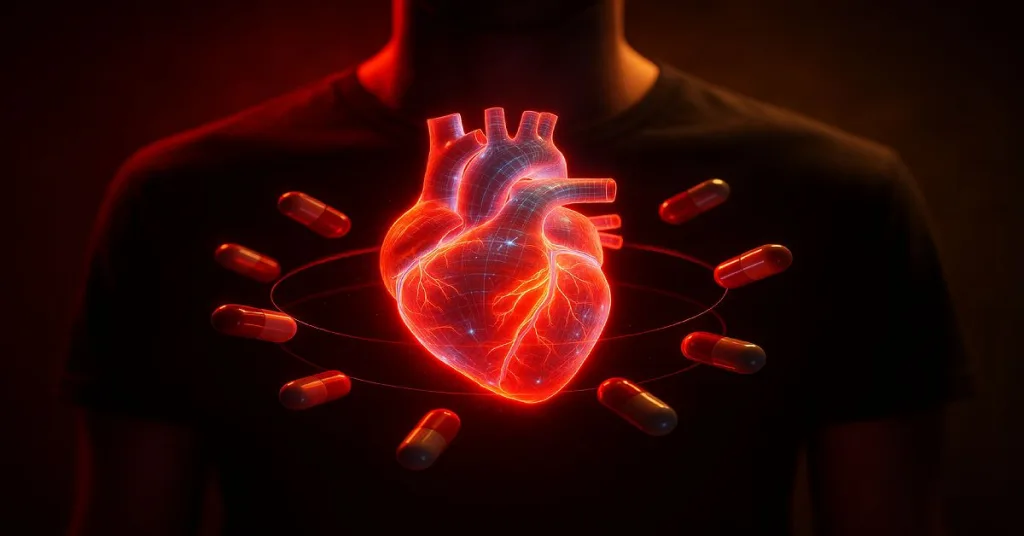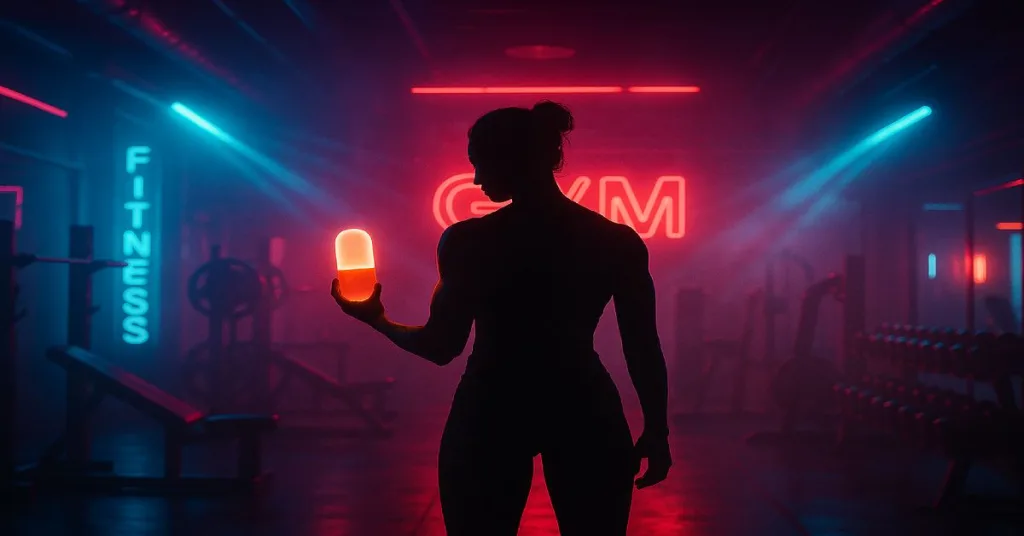The AI Health Craze Nobody Saw Coming
Artificial Intelligence writes love letters, passes the bar exam, and cranks out college essays in 10 seconds flat. Now, it’s sneaking into health advice. On TikTok, Reddit, and YouTube, AI is spitting out supplement stacks like a robot nutritionist.
But here’s the real question: can you actually trust ChatGPT or any AI with your health?
I put it to the test. I asked AI to design supplement stacks for three common goals:
- Better sleep
- Heart health
- Weight loss
Then I fact-checked its answers with real science, dosing data, and years of supplement experience. Sometimes it nailed the basics. Other times, it recommended garbage pills that could cost you money — or worse, damage your health.
By the end of this, you’ll see exactly where AI gets supplements right… and where it falls flat on its silicon face.
(Affiliate disclaimer: This article may contain affiliate links. If you click through and buy, we may earn a small commission at no extra cost to you.)
Why AI Supplements Are Trending Everywhere
AI is exploding because people want fast, cheap answers. Instead of paying a doctor or digging through PubMed, you can ask a chatbot: “What’s the best supplement for anxiety?” and get an instant list.
There’s no affiliate pitch, no Instagram “biohacker” trying to sell you their gummy brand. On the surface, it feels objective.
But here’s the problem: AI is trained on the internet, and the internet is full of junk science, outdated blog posts, and marketing copy. AI repeats it with confidence — but confidence doesn’t equal truth.
That’s why I ran this test. Let’s see what happens when machine hype meets human biology.
The AI Experiment: 3 Health Goals, 3 Stacks
I asked ChatGPT:
- “What are the best supplements for sleep?”
- “What are the best supplements for heart health?”
- “What are the best supplements for weight loss?”
I didn’t give it constraints, brands, or dosing. I wanted raw, unfiltered AI advice.
Here’s what came back — and what science says about it.

Fact-Checking AI’s Sleep Stack
AI’s Top Picks:
- Melatonin
- Magnesium
- Valerian root
- L-theanine
Sounds harmless, right? Let’s dig deeper.
- Melatonin — Great if you’re jet-lagged. Terrible as a nightly crutch. Long-term use can mess with your natural circadian rhythm, and many bottles on Amazon are dosed way too high. A 0.5–1mg dose is ideal, but most brands sell 5–10mg pills that wreck your sleep cycle.
- Magnesium — AI gets this partly right. But “magnesium” isn’t one thing. The oxide and citrate forms are useless for sleep. The only ones worth buying: magnesium glycinate or magnesium threonate.
- Valerian Root — Weak evidence, inconsistent results. It’s one of those “folk remedies” AI loves because it shows up in old blog posts, but clinical studies don’t back it strongly.
- L-Theanine — This one AI surprisingly nailed. It’s the calming amino acid in green tea that smooths out stress without sedation. Works even better when paired with magnesium.
👉 Verdict: AI did okay here — but it doesn’t tell you about forms, doses, or purity. That’s where people get screwed.
What Actually Works: Magnesium glycinate (NOW or Doctor’s Best), L-theanine (Suntheanine), and if needed, low-dose melatonin short-term.

Fact-Checking AI’s Heart Health Stack
AI’s Top Picks:
- Fish oil (omega-3s)
- CoQ10
- Magnesium
- Vitamin D
Not bad… but there’s a catch.
- Fish Oil — Here’s where AI parrots decades of outdated advice. Fish oil was hyped as a miracle pill, but most brands are oxidized, rancid, and underdosed. Recent studies show mixed results at best. If you want omega-3s, you’re better off eating salmon twice a week or using a high-quality triglyceride-form fish oil (very few brands actually meet that standard).
- CoQ10 — This is a smart pick, especially for anyone on statins or with heart failure. It actually improves mitochondrial energy in heart cells. But AI won’t tell you the difference between ubiquinone (cheap, weak) and ubiquinol (bioavailable, worth it).
- Magnesium — Again, AI lists it without context. Magnesium is crucial for heart rhythm and blood pressure — but only in absorbable forms. Magnesium oxide is basically chalk.
- Vitamin D — Yes, it’s important for heart and immune function. But AI doesn’t warn about balance with vitamin K2, which prevents calcium from ending up in your arteries.
👉 Verdict: AI is good at listing categories. But it doesn’t know the nuance that separates a supplement that works from a bottle of expensive nothing.
What Actually Works: CoQ10 (form matters): If you want the reduced form, choose ubiquinol (e.g., Qunol Ubiquinol/Mega Ubiquinol). If you’re fine with ubiquinone but want better uptake, choose a high-absorption ubiquinone like Qunol Ultra CoQ10., magnesium glycinate/threonate, vitamin D with K2, and whole food omega-3s or a trusted fish oil brand like Nordic Naturals.

Fact-Checking AI’s Weight Loss Stack
AI’s Top Picks:
- Green tea extract
- CLA (conjugated linoleic acid)
- Chromium
- Fiber supplements
This is where AI totally whiffs.
- Green Tea Extract — Some evidence it slightly boosts fat oxidation, but the effect is tiny unless you’re also exercising. Overhyped by supplement marketers.
- CLA — Basically useless. Multiple meta-analyses show little to no effect on weight loss. Just another “burn fat while you sleep” scam.
- Chromium — AI throws this in because of old studies linking it to blood sugar regulation. Reality: barely any effect unless you’re deficient.
- Fiber Supplements — This one’s valid. Fiber helps with appetite control. But it’s cheaper, safer, and healthier to eat vegetables, oats, beans, or psyllium husk than buying overpriced pills.
👉 Verdict: AI’s weight loss advice is garbage.
What Actually Works: Berberine (powerful for blood sugar), L-carnitine fumarate (supports fat metabolism, especially in combo with exercise), and plain old calorie tracking.
Where AI Gets It Right (and Where It Bombs)
Right:
- It pulls the “usual suspects” — melatonin, magnesium, CoQ10.
- It doesn’t upsell brands.
Wrong:
- It treats every supplement as equal (a $5 magnesium oxide looks the same as a $25 magnesium glycinate).
- It ignores dosing, purity, and real-world clinical strength.
- It repeats outdated supplement hype (fish oil, CLA).
AI is like a freshman writing a term paper: confident, thorough-sounding, but shallow once you look closer.
Should You Trust AI Over Your Doctor?
Here’s the blunt truth: AI can’t replace your doctor. It doesn’t know your history, your meds, or your risks.
But it can still be useful. Think of AI as a brainstorming tool. It can generate supplement ideas you may not have thought of — then it’s on you to fact-check, cross-reference, and pick the right brands.
A doctor may dismiss supplements entirely. AI at least gives you a list. But neither one is perfect. The sweet spot is AI + science + your judgment.
Final Word: Smarter Than AI, Cheaper Than Hype
AI can throw supplements at you, but it doesn’t tell you:
- Which forms actually absorb.
- Which doses matter.
- Which brands cut corners.
That’s where real research and experience matter.
So if you’re going to try supplements for sleep, heart health, or weight loss:
- Skip the AI listicles.
- Use tested, pure brands.
- Remember that AI doesn’t protect you from scams.
👉 Bottom Line: AI is fun for ideas, but if you want results, you need science-backed supplements — not robot hype.
for further reading: 5 Rookie Mistakes People Make With Supplements – And How to Avoid Them
Sources
- National Institutes of Health (NIH) Office of Dietary Supplements – Fact Sheets on Magnesium, Coenzyme Q10, and Vitamin D
- Mayo Clinic – Melatonin: What you need to know
- American Heart Association – Omega-3 Fatty Acids and Heart Health
- Examine.com – Evidence summaries on L-Theanine, Berberine, and L-Carnitine
- PubMed – Meta-analyses on CLA and chromium for weight loss